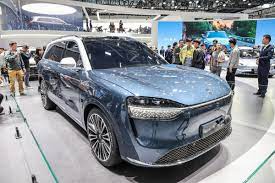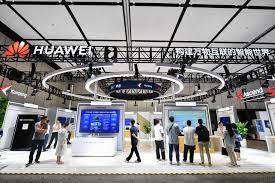Huawei revs up NEV sector with new SUV

Abdullah Jan
Islamabad: Huawei Technologies Co showcased its technological muscle in its latest SUV model on Tuesday, as the Chinese company aims to bring cutting-edge autonomous driving features to more cars amid stiff competition.
Huawei’s efforts for new growth engines in the face of prolonged restrictions imposed by the United States have progressed further with its sustained push for the burgeoning new energy vehicle sector, experts said.

Yu Chengdong, head of Huawei’s smart vehicle business unit, said at a product launch event in Shenzhen, Guangdong province, that it took three years for Huawei and Chinese carmaker Seres to codevelop the new Aito M9 SUV.
Yu said the Aito M9 features high-level autonomous driving technologies such as self-navigation on urban roads and expressways without reliance on high-definition maps, which are often considered a must for autonomous driving.
For long-haul trips, the system requires one manual intervention per 200 kilometers, and on urban roads, it can maneuver itself through fast traffic just like seasoned drivers, Yu said.
This is achieved in part by the vehicle’s combination of 27 sensors, including high-definition cameras and lidar – a detection system that works like radar but uses laser light – to detect objects more accurately and swiftly, Huawei said.
Artificial intelligence technologies and object-detection networks are also leveraged to support high-level autonomous driving.
“Starting from the end of December, users will be able to turn on the M9’s high-level autonomous driving functions when they are on urban roads and expressways across China,” Yu said, adding that Huawei has already received 54,000 preorders for the SUV.
Donghai Securities said in a research note that autonomous driving technologies are entering a phase of rapid growth in China, as tech giants such as Huawei and auto startups such as Nio and Li Auto are bringing more advanced driving assistance systems to cars.
Cui Dongshu, secretary-general of the China Passenger Car Association, said there is enough room for the development of smart cars in the 5G era. Huawei can offer a slew of technological solutions and services covering both hardware and software.
Cui said that China’s NEV sales in 2023 will reach the association’s estimated figure of 8.5 million units, as many automakers — both startups and established companies — experience growing momentum.
Huawei’s launch of its new model follows its splash in the NEV sector earlier this year. In November, more than 18,800 Aito vehicles were sold, up 127 percent year-on-year.
Last month, Huawei announced it would move its smart vehicle technologies and solutions into a joint venture with Chinese carmaker Changan, which will hold a stake of up to 40 percent in the joint venture.
Huawei said the equity stakes in the new joint venture will also be open to its existing partners and others of potential strategic value. Huawei has been codeveloping models with brands such as BAIC, JAC and Chery.
Zhong Shi, an independent auto analyst, said that Huawei has so far adopted two strategies to involve itself in the auto supply chain. One is for the supply of parts and technologies to automakers, like its cooperation with Changan.
“The other is the intelligent car selection mode. Huawei not only participates in product modeling, interior designing and intelligent solutions, but also is responsible for the marketing and sales of cars. A typical example is its cooperation with Seres, which has proved to be highly successful,” Zhong said.





